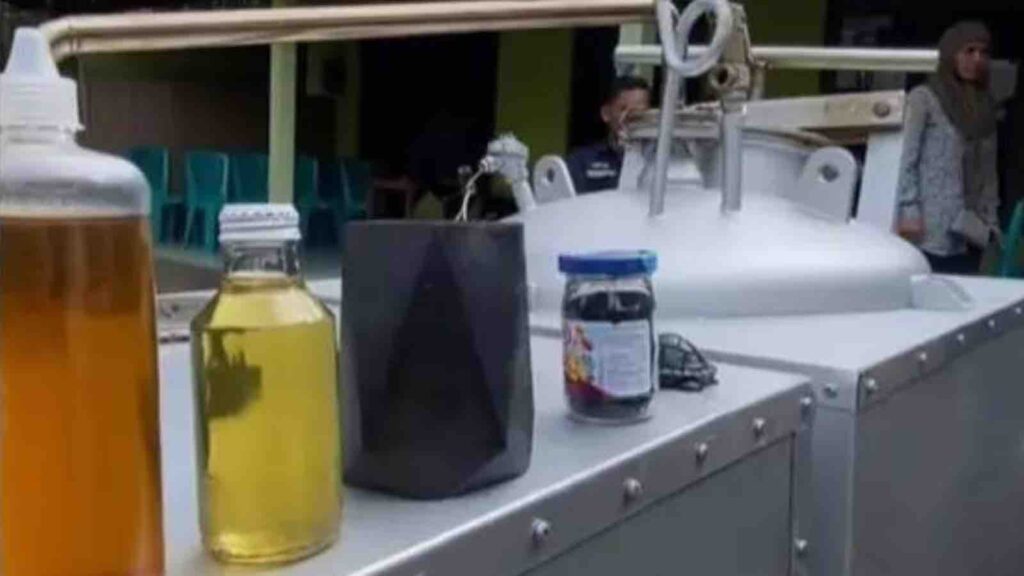The machine, which can process one kilogram of plastic waste into one liter of fuel, was installed to manage waste from the local Go Green Waste Bank Group.
In a groundbreaking initiative that could revolutionize waste management and energy production, the community of Cupuwatu 2 in Purwomartani, Kalasan, Sleman, Yogyakarta, has received a unique machine capable of converting plastic waste into usable fuel. This innovative technology, developed by the Get Plastic Indonesia Foundation, promises to address both environmental concerns and energy needs in one fell swoop.
RELEVANT SUSTAINABLE GOALS



Converting Plastic Waste Into Usable Fuel
The machine, which can process one kilogram of plastic waste into one liter of fuel, was installed to manage waste from the local Go Green Waste Bank Group. The device can transform household inorganic waste, particularly plastic, into diesel and gasoline equivalent to Pertamax quality fuel.
In a groundbreaking initiative that could revolutionize waste management and energy production, the community of Cupuwatu 2 in Purwomartani, Kalasan, Sleman, Yogyakarta, has received a unique machine capable of converting plastic waste into usable fuel. This innovative technology, developed by the Get Plastic Indonesia Foundation, promises to address both environmental concerns and energy needs in one fell swoop.
The process involves feeding the plastic waste into the machine, where it undergoes a transformation over several hours. The resulting fuel can be directly harvested through a tap. “The machine runs on gas power because it’s the most environmentally friendly fuel,” Wijanarko explained.
While the recycling process does produce some residue in the form of black carbon or black ash, this byproduct can be repurposed into handicrafts such as ashtrays and other decorative items, further reducing waste.
One of the most remarkable aspects of this technology is that the fuel produced can be used directly in motor vehicles without any additional processing. The Bali-based Get Plastic team has conducted extensive observations on various vehicles, including cars, over a three-year period. “The results show that the engines remain safe with no damage,” Wijanarko affirmed.
Kuncoro Eko Wibowo, the head of Cupuwatu 2 hamlet, expressed hope that the arrival of this machine would help address waste management issues in the area. Currently, Cupuwatu 2 produces approximately one ton of waste per week.
Pyrolysis: A Potential Solution for Plastic Waste
Pyrolysis is emerging as a promising solution to tackle the growing problem of plastic waste. This process reduces harmful emissions through gas filtration, producing fuel equivalent to diesel, gasoline, and propylene gas.
A single pyrolysis cycle can process 20 kg of soft plastic waste (HDPE, LDPE, PP, and multilayer soft plastics) and generate up to 20 liters of fuel, comprising 80% diesel and 20% gasoline. The resulting carbon powder residue can be repurposed into flower pots and other home decor products with the addition of resin. Additionally, they are experimenting with developing plant growth media from waste by mixing soil and compost.
However, the current drawback of this process is its high consumption of LPG, requiring about 12 kg to process 20 kg of plastic. To address this, the team at Get Plastic Indonesia is exploring alternative heating methods using burnt used engine oil or used cooking oil—materials that lack recycling solutions in Indonesia, particularly in remote areas.
All images & video courtesy of The Get Plastic Indonesia Foundation
You may also be interested in :
Gemah Ripah Market’s Innovative Biogas Power Plant: Turning Fruit Waste into Energy



